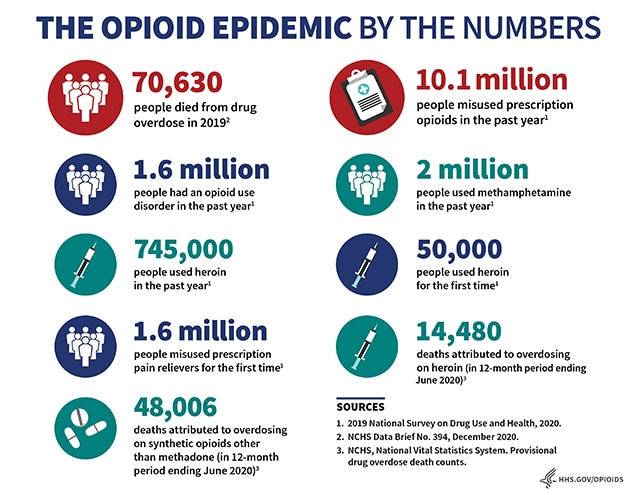What is the Opioid Crisis in America?
Since 1999, the opioid crisis in America has been responsible for over 1 million deaths. Opioid crisis deaths are due to opiates such as fentanyl – 50 times more potent than heroin (also an opioid), and pose an economic burden of up to $1.02 trillion!
This makes it a critical target of intervention in terms of reducing the economic and healthcare burden. First responders including policemen, firefighters and paramedics are usually the first point of contact for someone in a crisis. However, typically this system is not efficient enough to handle the crisis. Stigma towards addiction is sometimes not only an issue found in the general public, but also by emergency first responders, particularly when they are experiencing burnout and overload in the number of people seeking care.
Where Do People Get Opioids?
People who are addicted to opioids get these powerful drugs by one of two means:
- Legally: These include prescription painkilling drugs such as Oxicodone, Vicodin, Morphine, Codeine, Fentanyl.
- Or Illegaly: Heroin, illicitly manufactured fentanyl and morphine.
Why Do People Take Opiates?
These drugs give users a feeling euphoria, pain relief and sedation. They are extremely addictive, and after the first dose, one experiences a “high” that is so extreme, that typically when taking the next doses, one is unable to achieve this high again, and addiction results to the physiological need for the drug, and well defined withdrawal symptoms when stopping it.
In terms of how detrimental the opioid crisis in America is, the numbers are staggering. This image below demonstrates the opioid epidemic by the numbers according to the US department of Human Services in 2019:

How is the Opioid Crisis Affecting Us?
With COVID-19 still raging its war on people worldwide, this has caused a surge in opioid misuse, due to rising mental health issues such as anxiety, depression and PTSD. Access to services has reduced drastically too. This makes finding critical interventions to help the opioid crisis essential right now.
You may be asking “That’s awful, but how can I help?”
Here are some examples of steps you can help to improve the opioid crisis, and you don’t have to even leave your house!
Increase awareness and reduce stigma towards opioid use:
People with addictions typically experience stigma when it comes to their condition. This may prevent them from getting the necessary help that they need. It is essential to recognize that someone with opioid addiction is struggling, and this is a medical issue that needs to be addressed and can be treated. If you are on social media; Snapchat, Instagram, Facebook, Twitter, post about opioid addiction awareness loud and clear!
Ideas for what you can post on Social Media include:
- What the opioid crisis is
- What the signs and symptoms are
- Where someone can get professional help
- Call centers and helplines
If you would like more information concerning opioid overdose, you can check out the CDC’s Rx Awareness Campaign.
If you know someone with opioid addiction, inform yourself of possible treatment options:
If someone you know is willing to get help for opioid addiction, the first step is to direct them to a physician or health professional. This person may be able to direct the person to a medical specialist in addiction medicine, and get them the help they need!
Support cutting edge opioid treatments and intervention strategies with your vote:
When it comes to the ballot, your vote can change how crises are dealt with in the political sphere. Always make sure you register to vote, and vote for the person who is most in support, and demonstrates intellectually that they have ideas regarding the opioid crisis in America.
Buy a Locking Medication Bags
Buying locking medication bags and giving them to people who are prescribed opioids can help them to keep their medication secure. Having a lock on a bag seems like a very simple strategy but it is in fact very effective at warding off people that may attempt to prescription opioids.
If you are a doctor, or someone who is eligible to prescribe opioids – ADHERE TO OPIOID PRESCRIPTION REGULATIONS.
The opioid crisis in America has long been linked to medical professionals over-prescribing opioids. It is essential that you do not become part of the problem, or if you recognize you are, to stop it immediately.
If you want more ideas on how you can help, the CDC has plenty of resources.
In summary, the opioid crisis in America is a critical target of intervention when it comes to improving the lives of Americans, and reducing the economic burden on the country. Every day American’s can take part in reducing this burden by spreading awareness, directing people they know towards places of help, supporting cutting edge treatment and strategies by voting, and by medical professionals reducing their burden on this crisis by handling opioid prescriptions responsibly.
